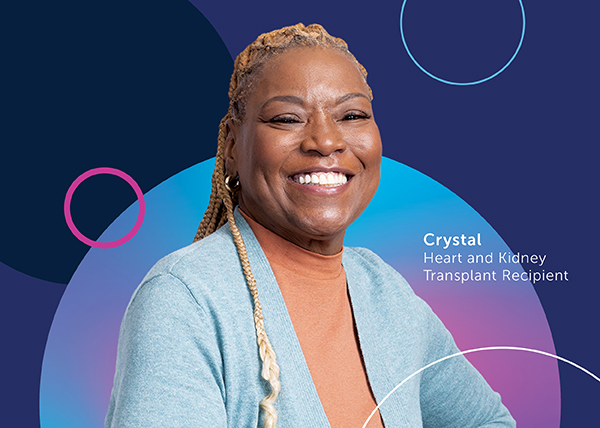Paid Advertisement

Jefferson Health patient, Crystal Safford, struggled with progressive heart disease, then heart failure. It would take a new heart AND a new kidney to save her life.
Crystal Safford made her way to the therapy gym at Jefferson Moss-Magee Rehabilitation with the assistance of a rollator walker and physical therapist Sarah McMahon by her side.
“I feel really good today,” Crystal shares. The 58-year-old had come a long way. Her emotional well-being, physical health and faith had been tested beyond measure. Crystal’s smile was beaming even brighter than usual because she was finally well enough to go home.
Caught by Surprise
Progressive heart disease occasionally landed Crystal in the hospital, and she recovered each time. But in April 2021, she abruptly collapsed at home and suffered three episodes of ventricular tachycardia - also known as v-tach. The dangerous heart arrhythmia occurs when the lower chamber beats too fast. It almost took her life that day.
During a visit with her cardiologist nine months earlier, Crystal learned she may eventually need a heart transplant. As she lay in her hospital bed, doctors told her she was in heart failure. Crystal’s kidneys were also not functioning well, and wouldn’t support her through a heart transplant. She couldn’t go home until she got a new heart and a new kidney.
“Although I had been hospitalized a few times, the reality of needing a double transplant really caught me by surprise,” Crystal says.
Waiting and Praying
Crystal was referred to the Jefferson Transplant Institute for care. Finding a donor match would be an additional feat. Tests showed high levels of antibodies in her blood, which can limit a patient’s ability to match with donors.
“It’s common in women who have had children, and in people who have mechanical devices implanted in their bodies, or have received blood transfusions,” explains heart transplant coordinator Olivia Leonard Millan. “In Crystal’s case, her body would reject an organ from someone she did not match perfectly. That would be fatal.”
Crystal’s health information was added to a database in which several criteria determine priority. Her care team worked to keep her health stabilized while she waited.
“She was tough going through it,” says heart transplant coordinator Drew Thabault. “Patients ask us all the time, ‘How long do I have to wait?’ Unfortunately, someone has to pass away for all this to happen. We just don’t know.”
Days turned into months as they waited for notification of a match. For most of the day, Crystal was bound to her bed with balloon pumps in her legs.
“I have a 30-year-old daughter and a 26-year-old son. I haven’t seen any weddings. I don’t have grandbabies. I’m not ready to go. So I told myself to trust God that I am going to get what I need.”
“We have a heart for you.”
Crystal had been waiting in a hospital bed for 69 days when she got the news she had been praying for.
“I was floored and grateful to God,” she says. “I got both the heart and the kidney from the same donor.”
She prepared for surgery, undergoing numerous tests to ensure she could handle the operation. As the organs were transported to Jefferson, surgery was underway so the heart could be placed into her chest upon arrival. “A heart should not be outside the body for more than four hours for the best chance of a successful transplant,” Drew explains.
Crystal’s transplant surgery was a success, but her journey was far from over. The high antibody levels in her blood meant there was a higher-than-normal chance her body could reject the new heart and kidney. Crystal would be monitored and cared for by the Jefferson Transplant Institute for the rest of her life.
“I hadn’t stood up in months.”
Crystal transferred to Moss-Magee Rehabilitation for the next stage in her healing journey.
“Crystal didn’t have the energy to perform even the most basic tasks,” explains occupational therapist Natalie Collins. “She couldn’t even sit up on her own.”
Crystal required medication and monitoring for her body to have the best chance at accepting the donor organs. Her care team at Moss-Magee Rehabilitation developed an individualized rehabilitation plan to help her get back to living her best life.
During daily occupational therapy sessions, Natalie helped Crystal get strong enough to get in and out of bed unassisted, brush her teeth, and shower and dress herself. Meanwhile, she worked with her two physical therapists, Sarah McMahon and Caitlin Corbin to build her overall strength and mobility.
“It’s a humbling experience when you have to depend on others to take care of you,” Crystal shares. “I knew this was part of the process of becoming healthy and independent.”
Positivity and Progress
In her last days of physical and occupational therapy, Crystal was tasked with repeating the balance and walking exercises she had performed at the beginning of her stay. The evidence of her recovery was in the numbers: She completed each exercise much faster and with more repetitions and strength.
“Crystal had a positive attitude since day one,” says Sarah. “Even if she was having a tough physical therapy session, she always looked for a silver lining.”
Six months after she was rushed to the hospital, Crystal headed home with a new heart, a new kidney and a new thirst for life. She couldn’t wait to enjoy the comforts of her own home and spend quality time with her family, whose visits helped keep her spirits high.
One year post-surgery, Crystal’s doctors cleared her to start driving again and get back to living her life. A few days later, Crystal and her daughter attended a musical at a local theater.
“There was a moment where I just took it all in,” Crystal remembers. “After everything I had gone through, here I was among these people, enjoying a play. Life is so sweet. I realized the breaks are off and I’m really living.”